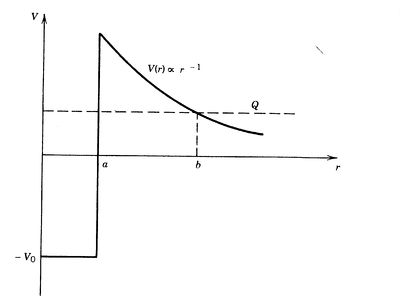|
|
| Line 1: |
Line 1: |
| '''Calculation of Gamow Factor for Alpha decay of Nuclei''' | | '''Calculation of Gamow Factor for Alpha decay of Nuclei''' |
|
| |
|
| [[Image:Gamow.jpg]] | | [[Image:Gamow.jpg|400px]] |
| Since the <math>\alpha</math>-decay happens in the nulcie then we can assume that an <math>\alpha</math>-decay is formed in the nucleus just before its emission (although <math>\alpha</math> particle doesnot exist in the nucleus). | | Since the <math>\alpha</math>-decay happens in the nulcie then we can assume that an <math>\alpha</math>-decay is formed in the nucleus just before its emission (although <math>\alpha</math> particle doesnot exist in the nucleus). |
| Inside the nucleus the particle will experience nuclear interaction which mostly attractive and outside the nucleus the inetraction would be coulombic(replusive). | | Inside the nucleus the particle will experience nuclear interaction which mostly attractive and outside the nucleus the inetraction would be coulombic(replusive). |
Calculation of Gamow Factor for Alpha decay of Nuclei
 Since the
Since the  -decay happens in the nulcie then we can assume that an
-decay happens in the nulcie then we can assume that an  -decay is formed in the nucleus just before its emission (although
-decay is formed in the nucleus just before its emission (although  particle doesnot exist in the nucleus).
Inside the nucleus the particle will experience nuclear interaction which mostly attractive and outside the nucleus the inetraction would be coulombic(replusive).
particle doesnot exist in the nucleus).
Inside the nucleus the particle will experience nuclear interaction which mostly attractive and outside the nucleus the inetraction would be coulombic(replusive).
Since the mathematical form of the nuclear interaction is not known we can model it by a square well type potential for the present purpose.
Outside the range of the nuclear interaction would be coulombic. So the coulomb interaction is,

where  is the atomic number of the rest of the nucleus(after decay).
is the atomic number of the rest of the nucleus(after decay).
From the WKB apporximation we know that at the turning point, 

Now the Transition probabilty
 ,
where
,
where 
and 

In the present problem  and
and 
Now,

![{\displaystyle =\left({\frac {2m}{\hbar ^{2}}}\right)^{\frac {1}{2}}\left({\frac {2z_{1}e^{2}}{4\pi \epsilon _{0}}}\right)^{\frac {1}{2}}\int _{R}^{R_{c}}\left[{\frac {1}{r}}-{\frac {1}{R_{c}}}\right]^{\frac {1}{2}}dr}](https://wikimedia.org/api/rest_v1/media/math/render/svg/704c867fbfd68503d98e2352a56e3dc0856925ed)
let, ![{\displaystyle I=\int _{R}^{R_{c}}\left[{\frac {1}{r}}-{\frac {1}{R_{c}}}\right]^{\frac {1}{2}}dr}](https://wikimedia.org/api/rest_v1/media/math/render/svg/b09dbdd1fdfee1a3afae0789b0d6929db2f56438)
Put,
 and
and




![{\displaystyle I=R_{c}^{\frac {1}{2}}\left[\theta -sin\theta cos\theta \right]_{0}^{cos^{-1}{\sqrt {\frac {R}{R_{c}}}}}}](https://wikimedia.org/api/rest_v1/media/math/render/svg/2aa79c198a1ee43e754aac6919586bef605162a1)
![{\displaystyle I=R_{c}^{\frac {1}{2}}\left[cos^{-1}{\sqrt {\frac {R}{R_{c}}}}-sin\left(cos^{-1}{\sqrt {\frac {R}{R_{c}}}}\right)cos\left(cos^{-1}{\sqrt {\frac {R}{R_{c}}}}\right)\right]}](https://wikimedia.org/api/rest_v1/media/math/render/svg/9f3e9d4836a3cccf4afec6f2113a890089721da1)
![{\displaystyle I=R_{c}^{\frac {1}{2}}\left[cos^{-1}{\sqrt {\frac {R}{R_{c}}}}-{\sqrt {\frac {R}{R_{c}}}}{\sqrt {1-{\frac {R}{R_{c}}}}}\right]}](https://wikimedia.org/api/rest_v1/media/math/render/svg/ddd8ea106e695fc1a0431d281b0751adffd8b22b)
![{\displaystyle I=R_{c}^{\frac {1}{2}}\left[cos^{-1}{\sqrt {\frac {R}{R_{c}}}}-{\sqrt {{\frac {R}{R_{c}}}-\left({\frac {R}{R_{c}}}\right)^{2}}}\right]}](https://wikimedia.org/api/rest_v1/media/math/render/svg/9bee83f3d745631af80ff96e0e49ddbdc1b021b4)
Let us consider 
Then we have

where 
Setting, charge of  particle = 2=
particle = 2=  (in general)
(in general)
![{\displaystyle \int q(x)dx=\left({\frac {2Mz_{1}z_{2}e^{2}R_{c}}{\hbar ^{2}4\pi \epsilon _{0}}}\right)^{\frac {1}{2}}\left[{\frac {\pi }{2}}-2\left({\frac {R}{R_{c}}}\right)^{\frac {1}{2}}\right]}](https://wikimedia.org/api/rest_v1/media/math/render/svg/10ddf1f8b60c0f1e03083fd83b7db47c840e53f0)
Now ![{\displaystyle T\cong e^{-2\int q(x)dx}=exp\left[-{\frac {\pi z_{1}z_{2}e^{2}}{\hbar 4\pi \epsilon _{0}}}\left({\frac {2M}{e}}\right)^{2}+{\frac {4}{\hbar }}\left({\frac {2z_{1}z_{2}e^{2}MR}{4\pi \epsilon _{0}}}\right)^{\frac {1}{2}}\right]}](https://wikimedia.org/api/rest_v1/media/math/render/svg/a8aeba74ac8f94d3819d6c818cde2d4ab9af4740)
Now putting  , veloctiy of the particle
, veloctiy of the particle

The 1st exponential term is known as the Gamow factor. The Gamow factor determines the dependence of the probability on the speed (or energy) of the alpha particle.
 Since the -decay happens in the nulcie then we can assume that an -decay is formed in the nucleus just before its emission (although particle doesnot exist in the nucleus).
Inside the nucleus the particle will experience nuclear interaction which mostly attractive and outside the nucleus the inetraction would be coulombic(replusive).
Since the -decay happens in the nulcie then we can assume that an -decay is formed in the nucleus just before its emission (although particle doesnot exist in the nucleus).
Inside the nucleus the particle will experience nuclear interaction which mostly attractive and outside the nucleus the inetraction would be coulombic(replusive).












![{\displaystyle =\left({\frac {2m}{\hbar ^{2}}}\right)^{\frac {1}{2}}\left({\frac {2z_{1}e^{2}}{4\pi \epsilon _{0}}}\right)^{\frac {1}{2}}\int _{R}^{R_{c}}\left[{\frac {1}{r}}-{\frac {1}{R_{c}}}\right]^{\frac {1}{2}}dr}](https://wikimedia.org/api/rest_v1/media/math/render/svg/704c867fbfd68503d98e2352a56e3dc0856925ed)
![{\displaystyle I=\int _{R}^{R_{c}}\left[{\frac {1}{r}}-{\frac {1}{R_{c}}}\right]^{\frac {1}{2}}dr}](https://wikimedia.org/api/rest_v1/media/math/render/svg/b09dbdd1fdfee1a3afae0789b0d6929db2f56438)





![{\displaystyle I=R_{c}^{\frac {1}{2}}\left[\theta -sin\theta cos\theta \right]_{0}^{cos^{-1}{\sqrt {\frac {R}{R_{c}}}}}}](https://wikimedia.org/api/rest_v1/media/math/render/svg/2aa79c198a1ee43e754aac6919586bef605162a1)
![{\displaystyle I=R_{c}^{\frac {1}{2}}\left[cos^{-1}{\sqrt {\frac {R}{R_{c}}}}-sin\left(cos^{-1}{\sqrt {\frac {R}{R_{c}}}}\right)cos\left(cos^{-1}{\sqrt {\frac {R}{R_{c}}}}\right)\right]}](https://wikimedia.org/api/rest_v1/media/math/render/svg/9f3e9d4836a3cccf4afec6f2113a890089721da1)
![{\displaystyle I=R_{c}^{\frac {1}{2}}\left[cos^{-1}{\sqrt {\frac {R}{R_{c}}}}-{\sqrt {\frac {R}{R_{c}}}}{\sqrt {1-{\frac {R}{R_{c}}}}}\right]}](https://wikimedia.org/api/rest_v1/media/math/render/svg/ddd8ea106e695fc1a0431d281b0751adffd8b22b)
![{\displaystyle I=R_{c}^{\frac {1}{2}}\left[cos^{-1}{\sqrt {\frac {R}{R_{c}}}}-{\sqrt {{\frac {R}{R_{c}}}-\left({\frac {R}{R_{c}}}\right)^{2}}}\right]}](https://wikimedia.org/api/rest_v1/media/math/render/svg/9bee83f3d745631af80ff96e0e49ddbdc1b021b4)




![{\displaystyle \int q(x)dx=\left({\frac {2Mz_{1}z_{2}e^{2}R_{c}}{\hbar ^{2}4\pi \epsilon _{0}}}\right)^{\frac {1}{2}}\left[{\frac {\pi }{2}}-2\left({\frac {R}{R_{c}}}\right)^{\frac {1}{2}}\right]}](https://wikimedia.org/api/rest_v1/media/math/render/svg/10ddf1f8b60c0f1e03083fd83b7db47c840e53f0)
![{\displaystyle T\cong e^{-2\int q(x)dx}=exp\left[-{\frac {\pi z_{1}z_{2}e^{2}}{\hbar 4\pi \epsilon _{0}}}\left({\frac {2M}{e}}\right)^{2}+{\frac {4}{\hbar }}\left({\frac {2z_{1}z_{2}e^{2}MR}{4\pi \epsilon _{0}}}\right)^{\frac {1}{2}}\right]}](https://wikimedia.org/api/rest_v1/media/math/render/svg/a8aeba74ac8f94d3819d6c818cde2d4ab9af4740)

